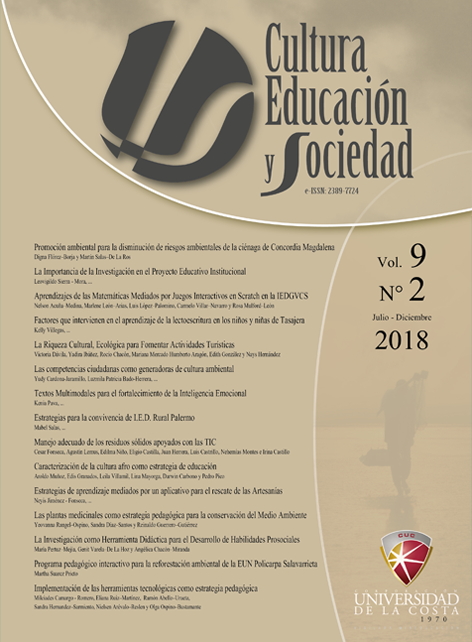Strategies for the coexistence of I.E.D. Rural Palermo
DOI:
https://doi.org/10.17981/cultedusoc.9.2.2018.09Keywords:
Reconstruction; preservation; cultural identityAbstract
The objective of the present investigation was to reconstruct the history of the corregimiento of Tasajera for the preservation of the cultural identity of the students. The research is qualitative, the participating population is the fourth grade students of the Palermo Rural Educational Institution. As an information gathering technique, the interview was used and the history of life was applied as an instrument. As conclusions it is important to infer that within the school there is little tolerance among students so the challenge, for the Educational Institution is to implement strategies that strengthen a healthy coexistence hand in hand with democracy and citizenship training since it has a close relationship with education and therefore these aspects favor individuals so that they have and can carry in the situations that are presented to them on a daily basis.
Downloads
References
Agudelo C, H. A. (1998). Educación en los valores. Bogotá, Colombia. Obtenido de http://www.worldcat.org/title/educacion-en-los-valores-talleres-pedagogicos/oclc/57073879.
Alonso, L. E. (2007). Sujeto y discurso: el lugar de la entrevista abierta en las prácticas de la sociología educativa. Obtenido de http://mastor.cl/blog/wp-content/uploads/2016/01/Alonso-Cap-2-Sujeto-y-Discurso-El-Lugar-de-La-Entrevista-Abierta.pdf.
Ander-Egg, E. (1977). Técnicas de investigación social (23 ed.). Buenos Aires, Argentina: Magisterio de Río de la Plata. Obtenido de http://abacoenred.com/wp-content/uploads/2017/05/T%C3%A9cnicas-de-investigaci%C3%B3n-social-ed.23-Ander-Egg-Ezequiel.pdf.pdf.
Araos San Martín, J. (2008). Relativismo, tolerancia y democracia (Vol. 3). (Veritas, Ed.) Chile. Obtenido de file:///C:/Users/HP/Downloads/Dialnet-RelativismoToleranciaYDemocraciaEnHKelsen-2723232.pdf.
Avendaño ,I;Cortés O , Guerrero Hilda( 2015) Competencias sociales y tecnologías de la información y la comunicación como factores asociados al desempeño en estudiantes de básica primaria con experiencia de desplazamiento forzado Diversitas: Perspectivas en Psicología, vol. 11, núm. 1, 2015, pp. 13-36 Universidad Santo Tomás Bogotá, Colombia.http://www.scielo.org.co/pdf/dpp/v11n1/v11n1a02.pdf.
Casassus, J. (2000). Problemas de la gestión educativa en América Latina. Santiago de Chile, Chile. Obtenido de http://www.lie.upn.mx/docs/Especializacion/Gestion/Lec2%20.pdf.
Chacón, E. (2011). Gestión institucional para la mediación de conflictos en ambientes de convivencia escolar. Obtenido de http://e4c9a13.soopbook.es/.
Duch, L. (1997). La educación y la crisis de la modernidad. (E. Paidós, Ed.) España. Obtenido de https://www.planetadelibros.com/libro-la-educacion-y-la-crisis-de-la-modernidad/18481.
Gimeno Sacristán, J. (2007). Investigacion E Innovacion Sobre La Gestion Pedagogica De Los Equipos ensayos y trabajos de investigación. (Morata, Ed.) Madrid, España. Obtenido de http://galeon.com/chanram/parte1.pdf.
González-Luna, T. (2010). DEMOCRACIA Y FORMACIÓN CIUDADANA. Tepepan, México. Obtenido de https://www.ses.unam.mx/curso2015/pdf/2oct-GonzalezLuna.pdf.
Guerrero. H, Cepeda,M.(2016) Uso de estrategias pedagógicas para el fortalecimiento de la convivencia escolar de jóvenes vulnerables.http://saber.ucv.ve/ojs/index.php/rev_ped/article/view/12501.
Hernández Sampier, R., Fernández Collado, C., & Baptista Lucio, M. D. (2004). Metodología de la investigación (5 ed.). México: McGraw Hill. Obtenido de https://www.esup.edu.pe/descargas/dep_investigacion/Metodologia%20de%20la%20investigaci%C3%B3n%205ta%20Edici%C3%B3n.pdf.
Hernández, I. (2004). Educar para la tolerancia: una labor conjunta. México, México: Revista mexicana de ciencias políticas y sociales. Obtenido de http://www.revistas.unam.mx/index.php/rmcpys/article/view/42457.
Herrera, B. (2014). Las acciones colectivas en Colombia frente a una realidad global: El derecho de consumo. Barranquilla, Colombia. Obtenido de http://www.scielo.org.co/pdf/just/n25/n25a04.pdf.
Soto Salas, H, y Martínez J.C. (2017). La Evaluación : más alla del concepto; noción en los enfoques de evaluación. En González Velasco J M (coord.) Educación Emergente. Paradigma del Siglo XXI. (pp. 77-89) Bolivia. Editorial PRISA Ltda.
Martínez-Otero Pérez, V. (2001). Convivencia escolar: problemas y soluciones (Vol. 12). (R. c. Educación, Ed.) Madrid, España. Obtenido de file:///C:/Users/HP/Downloads/17762-17838-1-PB%20(2).PDF.
Noto, C. (2002). Normas de convivencia en el aula y en el centro. (C. Mayor, Ed.) Barcelona, España. Obtenido de http://aprendeenlinea.udea.edu.co/revistas/index.php/revistaeyp/article/view/9836/0.
Olaya Villar, M. D. (2002). Educación en valores: La Tolerancia. Albacete, España. Obtenido de https://previa.uclm.es/ab/educacion/ensayos/pdf/revista17/17_12.pdf.
Ortega, P., & Minguez, R. (2001). Valores de la educación para el desarrollo. Obtenido de file:///C:/Users/HP/Downloads/Dialnet-ValoresYEducacionParaElDesarrollo-117893.pdf.
Peters, R. (1969). El concepto de educación (1 ed.). (Paidós, Ed.) Buenos aires, Argentina. Obtenido de http://www.bibvirtual.ucb.edu.bo/opac/Record/144551/Description.
Quiroz, R. E. (2011). CURRÍCULO CRÍTICO EN LA FORMACIÓN CIUDADANA. (A. arbitrados, Ed.) Medellín, Colombia. Obtenido de http://www.saber.ula.ve/bitstream/123456789/35318/1/articulo6.pdf.
Rodríguez-Burgos, K., Martínez Cárdenas, A. A., & Rodríguez-Serpa, F. A. (2017). Estudio empírico sobre los valores democráticos de tolerancia y respeto en la generación milenaria. usticia. Barranquilla, Colombia. Obtenido de http://www.scielo.org.co/scielo.php?pid=S0124-74412017000100135&script=sci_abstract&tlng=es.
Ruíz, R. O. (2007). La convivencia: un regalo dela cultura a la escuela. Córdoba, España. Obtenido de https://www.researchgate.net/publication/39219654_La_convivencia_un_regalo_de_la_cultura_a_la_escuela.
Tejedor, F. J. (2004). Competencias de los profesores para el uso de las TIC en la enseñanza. Análisis de sus conocimientos y actitudes. (R. e. pedagogía, Ed.) Salamanca, España. Obtenido de file:///C:/Users/HP/Downloads/Dialnet-CompetenciasDeLosProfesoresParaElUsoDeLasTICEnLaEn-1973261.pdf.
Tuvilla R, J. (2004). Convivencia escolar y resolución pacífica de los conflictos. Barcelona, España. Obtenido de http://soda.ustadistancia.edu.co/enlinea/pazatiempo/eje3/mod5/unidad1/Resolucion_pacifica_conflictos.pdf.
Viñas, J. (2002). Comunicación y participación en el centro y en el aula para la resolucion de conflictos. Barcelona, España. Obtenido de https://books.google.com.co/books?id=eT-dTLzaGAEC&pg=PA39&lpg=PA39&dq=.+Comunicaci%C3%B3n+y+participaci%C3%B3n+en+el+centro+y+en+el+aula+para+la+resoluci%C3%B3n+de+conflictos.&source=bl&ots=uWIGZqwFp3&sig=7LJzNDvtJ9ULCmxIlZ1eXzg1Aq0&hl=es&sa=X&ved=0ahUKEw.
Downloads
Published
How to Cite
Issue
Section
License
Copyright (c) 2018 CULTURA EDUCACIÓN Y SOCIEDAD

This work is licensed under a Creative Commons Attribution-NonCommercial-NoDerivatives 4.0 International License.
![]()
Creative Commons 2020 CULTURA EDUCACIÓN Y SOCIEDAD
This article is under international license Creative Commons Reconocimiento-NoComercial-SinObrasDerivadas 4.0.
The published articles are the sole responsibility of their authors and do not necessarily reflect the opinions of the editorial committee.
CULTURA EDUCACIÓN Y SOCIEDAD respects the moral rights of its authors, who assign to the editorial committee the patrimonial rights of the published material. In turn, the authors inform that this work is unpublished and has not been previously published.
All articles are under a:
Licencia Creative Commons Atribución-NoComercial-SinDerivadas 4.0 Internacional.
![]()


 English
English
 Español (España)
Español (España)




_12.53_.27_p_. m_._3.png)





_12.57_.35_p_. m_._3.png)
_12.50_.37_p_. m_._3.png)



